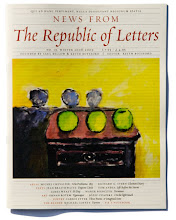Search This Blog
Monday, December 21, 2009
THE BULWER-LYTTON PRIZE
I will be accused of humorlessness, but I beg to differ with the principle. On the following grounds: (A) It is no great task to find far worse first sentences than Bulwer-Lytton's in existing novels written today, where they flourish by the dozen. (B) For Snoopy, already a literate and ambitious dog, that opening sentence certainly has a meaning and a reason behind it -- dogs don't like such nights; they shiver, bark, howl and cower. (C) Bulwer-Lytton, like many another neglected Victorian from the great age of the novel, was a writer of some substance.
Okay, so it's all in good fun. We like spoofs. The underlying truth is, however, that there are very few people left who can read Bulwer-Lytton: his language is alien, difficult, and requires effort and attention -- as does Dickens'. There is, on the Net, a professorial quiz which proposes that the reader identify specific passages of Dickens (presumably good) and Bulwer-Lytton (presumably bad). It is a tricky test and a false one. Other passages in either author could reverse the verdict. This gradual effacementof the literature of the past, and its language, is something we might deplore rather than seek to parody. My Oxford Edition of Our Mutual Friend contains many pages of notes to explain Dickens' fascination with, for instance, the specific languages of trades now long lost, doll-makers, conveyancing clerks, water-men, Philistines of the day and such. On my shelves is a treasured dictionary, the Dictionnaire du monde rural, in which one can recover the implements used in threshing, winnowing and other rural pursuits. Every language loses a part of its lexicon every day. Danbury, Connecticut, was the hat capital of America; now the only head-cover we see is the baseball cap. The loss is constant, and the language is not replenished by the conjugation or declension of 'f**k', which seems to be as far as common parlance goes. What is a writer to do if the language he uses erodes even as he writes?
It was a dark and stormy night when the profs of San Jose State thought they knew what bad writing was. Far greater pollution is shown daily and climate change can't be blamed for the poverty of our current language.
Sunday, December 6, 2009
Maasimo Rizzante: Non siamo gli ultimi (Effigie, Milano, 2009)
In his excellent run-through of the principal themes of twentieth-century literature, Massimo Rizzante (see his text on Roberto Bolano in TRoL 20), a poet and connoisseur, wrote about TRoL as follows:
"In 1997, after fifty years of feverish activity as a writer, journalist, translator, historian and university professor, Keith Botsford, with his great friend Saul Bellow, founded 'News from the Republic of Letters'. This is a cosmopolitan review, entirely without advertising or sponsorship, with a few thousand readers. Part of its purpose, KB explained, was to give some hope to good young writers who found it difficult to publish their work. Saul Bellow spent a good deal of his time reading unpublished manuscripts and defined this task as 'both a duty and an Utopian act' in a world in which attentiveness to quality writing was ever more the province of a very small circle of readers. [. . .] I was at the time a young provincial European, imbued with a natural pessimism. When I met him, this seventy-year-old giant, a constant smoker and full of energy, said: 'You remember the early Christians? Today art survives in the catacombs, and it is in the catacombs that faith retains and strengthens its resolve and its hope to see once more the light of day.' One day, ten years ago, I asked Bellow if there existed any sure way with which to form Sensibility. He said he didn't, unless it might be through taking into oneself certain literary masterpieces as if they were consecrated hosts.
"It is perhaps partly the curiosity of a tourist who becomes an exegete, or an exegete who fancies tourism, someone who is not limited by -- he lacks the necessary time -- the possibilities and limitations of individuals, but who has the illusion that he is able to be, at any time or in any place, at home. As KB said, it was like Augustine's 'vain curiosity', the curiosity that led some to seek out, without any particular purpose, that which lies beyond his own existence, that is outside of himself. [. . .] Every time I open an issue, I am taken miles away from Literaturistan. Every literary review worthy of the name has the same desire to embrace Weltliteratur; it is a desire without limits and should stay such. Goethe defined it as a 'madness': a madness and a faith rising from the catacombs.












